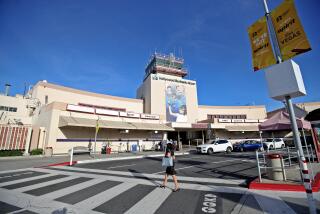The world is full of losers -- and you may be one
IN Oscar Wilde’s comedy “The Importance of Being Earnest,” a governess leaves a baby in a handbag at London’s Victoria Station. I’ve never been that absent-minded, but I must admit I almost always leave something behind on trips.
My mother knew I tended to forget my toothbrush when I visited her in Washington, D.C., so she never failed to have a new one for me in the guest bathroom.
I have left so many wristwatches and sunglasses in faraway places -- on tables in restaurants, park benches, bathroom sinks, who knows where else -- that I finally realized I was never going to hang on to them. Now I only wear cheap drugstore watches and shades.
Some years ago I locked my New York apartment, got in a cab for JFK airport to catch a plane to Madrid and realized, halfway across the Brooklyn Bridge, I didn’t have my passport. Fortunately, I had time to go back and get it.
I’m a seasoned traveler who makes lists and checks them twice before leaving home. So I have no excuse for oversights, except, perhaps, the obvious one: It’s only human to forget things.
Susan Foster, the author of “Smart Packing for Today’s Traveler,” says she frequently left her nightgown on the back of the hotel room bathroom door. When she got home, unpacked and realized the nightie was missing, she always knew exactly where she’d left it.
Forgetting things is a good justification for shopping on the road. I forgot to pack my glasses on a trip to Germany not long ago, though I could have gotten by because I usually wear contact lenses. Wandering through the hamlet of Gelnhausen near Frankfurt, I passed an optical shop one morning and went in on a whim. The head optician was an elderly man who spoke halting English and had a reassuring air. He tested my eyes, helped me choose frames and had new glasses for me by lunchtime. Whenever I put them on I think of him.
Sometimes the relief of getting an item back is almost worth the pain of having lost it. I once left my carry-on bag, with everything important to me in it (including my plane tickets), on one of the shuttle buses that takes travelers between terminals at the Honolulu airport. I realized it immediately and stood at the curb, tensely waiting for the bus to circle back. Two shuttles stopped, but they didn’t have any luggage. Then a third arrived and its door opened. My battered old bag was on the seat behind the driver. What joy!
Don’t underestimate the trouble and grief, the missed flights and panicked visits to U.S. consulates that come from losing important items on the road. A traveler can’t go far without a passport and tickets but is wise to take nothing else of material or sentimental value.
The 1988 movie “The Accidental Tourist,” based on a novel by Anne Tyler, opens with Macon Leary, a writer of travel guidebooks, played by William Hurt, packing a suitcase with great deliberation. “Never take along anything so valuable or dear that its loss would devastate you,” he says.
Other experts offer more strategies to avoid losing things on the road. “Consolidate your packing in two bags, one to check and one to carry on,” says Christopher McGinnis, travel correspondent for CNN Headline News. “That way you know you’ve got everything if you have a bag in each hand.” Adding a laptop in a separate carrying case to this configuration could be disastrous. It’s best to get a carry-on bag big enough for the computer and other personal items so the laptop can’t easily be left behind, McGinnis advises.
Stuffbak, a 4-year-old company in Boulder, Colo., provides labels for valuables. If an item gets lost and someone finds it, the label explains how to return it, for a reward, by calling Stuffbak’s toll-free number, (800) 800-8257, www.stuffbak.com. Karen Edwards, a Stuffbak vice president, says the service has helped travelers get back items as varied as cell phones and insulin pumps.
When author Foster takes a trip with many stops, she doesn’t completely empty her suitcase at each new hotel. “I don’t regularly unpack and put things in drawers,” she says. “If things are out of sight, they’re out of mind.”
Judith Gilford, author of “The Packing Book,” organizes her travel gear in plastic pouches with items bagged together according to the place where they will be used, such as the bathroom. She keeps a list of the pouches and reviews it every time she repacks.
“The better we can organize things physically and mentally, the better off we are,” says Ken Higbee, a psychology professor at Brigham Young University in Provo, Utah, and author of “Your Memory: How It Works and How to Improve It.” He starts getting ready for a trip early by putting things aside as he thinks of them. Packing at the last minute makes a person rushed and prone to distractions, Higbee says.
Travel is discombobulating, but its displacement brings both losses and gains. When an airline lost my luggage on a Christmas trip to Cape Cod, Mass., I discovered I looked fetching in my brother-in-law’s baggy old bluejeans. In “The Importance of Being Earnest,” the baby in the misplaced handbag is found by loving foster parents, and in “The Accidental Tourist,” Leary finds a better life -- but only by losing something important first.
More to Read
Sign up for The Wild
We’ll help you find the best places to hike, bike and run, as well as the perfect silent spots for meditation and yoga.
You may occasionally receive promotional content from the Los Angeles Times.






